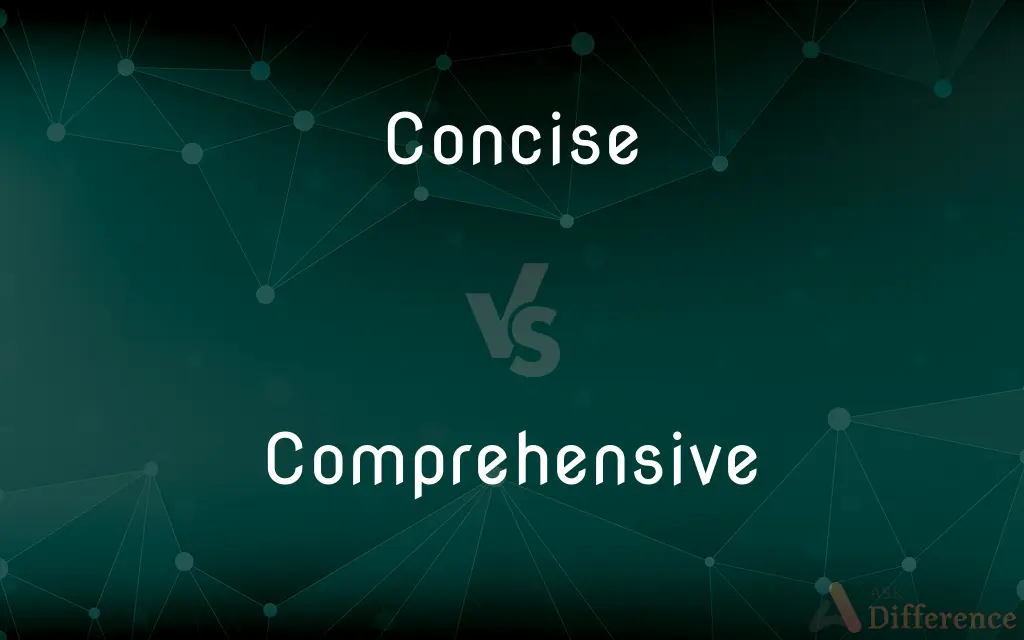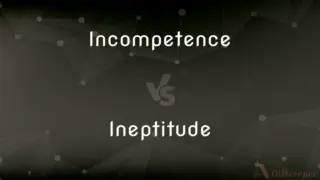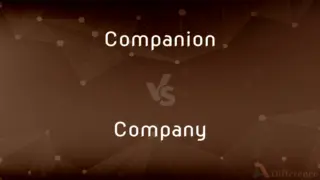Concise vs. Comprehensive — What's the Difference?
Edited by Tayyaba Rehman — By Urooj Arif — Updated on March 29, 2024
Concise communication delivers information in the fewest possible words without sacrificing clarity, focusing on brevity. Comprehensive communication, however, covers a topic in exhaustive detail, ensuring nothing is overlooked.

Difference Between Concise and Comprehensive
Table of Contents
ADVERTISEMENT
Key Differences
Concise communication is valued for its brevity and ability to convey essential information quickly and efficiently. This is particularly useful in settings where time is limited or when a summary is required. On the other hand, comprehensive communication ensures thorough understanding by covering a subject in depth, including all necessary details and nuances, which is crucial for complex or technical subjects.
In a concise message, every word is chosen carefully to maximize clarity and meaning within a limited space. This can make concise communication both challenging and artful. Whereas, comprehensive communication allows for the exploration of various aspects and perspectives of a topic, often leading to a more nuanced understanding.
Conciseness often requires the reader or listener to have a degree of background knowledge or context to fully understand the abbreviated message. In contrast, comprehensive explanations aim to be accessible to a wider audience, including those with little to no prior knowledge of the subject.
The goal of concise communication is to save time and reduce cognitive load, making it ideal for quick decision-making or when providing an overview. Comprehensive communication, conversely, aims to educate or inform by leaving no stone unturned, making it suitable for educational purposes, detailed reports, or in-depth analysis.
Despite their differences, both concise and comprehensive communications have their place. The choice between them depends on the audience, purpose, and context. Concise messages are effective for quick updates or summaries, while comprehensive communication is necessary for understanding complex issues in full.
ADVERTISEMENT
Comparison Chart
Purpose
Quick conveyance of essential information
Detailed exploration of a topic
Detail Level
Minimal, only essentials
Exhaustive, covering all nuances
Audience Expectation
Background knowledge often required
Accessible to newcomers
Ideal Usage
Summaries, quick updates
Educational content, in-depth analysis
Challenge
Maximizing clarity in limited words
Ensuring completeness without redundancy
Compare with Definitions
Concise
Focused Information.
The guidebook was concise, offering just the essential tips for travelers.
Comprehensive
Inclusivity of Information.
His book is comprehensive, addressing all theories related to the subject.
Concise
Clarity and Precision.
Her concise explanation made the complex concept easily understandable.
Comprehensive
Exhaustive Exploration.
The documentary provided a comprehensive overview of the historical event.
Concise
Summarization.
The abstract provided a concise overview of the research paper.
Comprehensive
Educational Depth.
The course offers comprehensive training in digital marketing, suitable for all levels.
Concise
Efficiency in Communication.
The executive's email was concise, clearly stating the decision without unnecessary detail.
Comprehensive
Detail-Oriented.
The comprehensive report covered every aspect of the project, leaving no questions unanswered.
Concise
Brevity.
The slogan's concise wording made it memorable and effective.
Comprehensive
Thoroughness.
The manual is comprehensive, containing detailed instructions and FAQs.
Concise
Concise is a municipality in the district of Jura-Nord Vaudois in the canton of Vaud in Switzerland.
Comprehensive
So large in scope or content as to include much
A comprehensive history of the revolution.
Concise
Giving a lot of information clearly and in a few words; brief but comprehensive
A concise account of the country's history
Comprehensive
Marked by or showing extensive understanding
Comprehensive knowledge.
Concise
Expressing much in few words; clear and succinct.
Comprehensive
An examination or series of examinations covering the entire field of major study, given to a student in the final year of undergraduate or graduate study.
Concise
Brief, yet including all important information
Comprehensive
Broadly or completely covering; including a large proportion of something.
When there are diametrically opposing views on a big issue that concerns millions of people, doing comprehensive research just makes sense.
Concise
(obsolete) Physically short or truncated
Comprehensive
(British) A comprehensive school.
Concise
To make concise; to abridge or summarize.
Comprehensive
Including much; comprising many things; having a wide scope or a full view.
A very comprehensive definition.
Large and comprehensive idea.
Concise
Expressing much in a few words; condensed; brief and compacted; - used of style in writing or speaking.
The concise style, which expresseth not enough, but leaves somewhat to be understood.
Where the author is . . . too brief and concise, amplify a little.
Comprehensive
Having the power to comprehend or understand many things.
Concise
Expressing much in few words;
A concise explanation
Comprehensive
Possessing peculiarities that are characteristic of several diverse groups.
Comprehensive
Including all or everything;
Comprehensive coverage
A comprehensive history of the revolution
A comprehensive survey
A comprehensive education
Comprehensive
Broad in scope;
A comprehensive survey of world affairs
Comprehensive
Being the most comprehensive of its class;
An unabridged dictionary
Common Curiosities
Can communication be both concise and comprehensive?
While challenging, some communications strike a balance by being concise on a broad level but include comprehensive details as needed.
How does comprehensive communication differ from concise communication?
Comprehensive communication covers a topic in detail, ensuring all aspects and nuances are explored, unlike concise communication which is brief.
What does concise communication entail?
Concise communication involves delivering information succinctly, using the fewest possible words without losing clarity.
When is concise communication preferred?
It's preferred for quick updates, summaries, or when time and attention are limited.
What role does audience play in determining the style of communication?
The audience's background knowledge and needs dictate whether concise or comprehensive communication is appropriate.
Why is conciseness important in business communication?
It saves time and reduces the cognitive load, making it easier to make quick decisions.
How can one achieve comprehensive communication effectively?
By organizing information logically, covering all necessary aspects, and avoiding unnecessary repetition.
How can one improve their concise communication skills?
Practice summarizing complex ideas into fewer words while maintaining clarity and completeness.
What are the benefits of comprehensive communication?
It ensures a thorough understanding by covering a subject in depth, ideal for complex or technical topics.
Can concise communication be misunderstood?
Yes, if it's too brief or assumes too much prior knowledge, it may lead to misunderstandings.
What challenges arise in comprehensive communication?
It can lead to information overload or disinterest if not well-structured or too lengthy.
Can the choice between concise and comprehensive communication affect message reception?
Yes, depending on the audience's expectations and the context, the effectiveness of the message can vary significantly.
Is comprehensive communication always better for educational purposes?
Typically, yes, because it ensures a complete understanding by explaining concepts in detail.
How do digital platforms influence the choice between concise and comprehensive communication?
Digital platforms often favor concise communication due to limited attention spans, but comprehensive content is sought after for learning.
Does concise communication exclude important details?
It focuses on essential information, but there's a risk of omitting important nuances.
Share Your Discovery

Previous Comparison
Incompetence vs. Ineptitude
Next Comparison
Companion vs. CompanyAuthor Spotlight
Written by
Urooj ArifUrooj is a skilled content writer at Ask Difference, known for her exceptional ability to simplify complex topics into engaging and informative content. With a passion for research and a flair for clear, concise writing, she consistently delivers articles that resonate with our diverse audience.
Edited by
Tayyaba RehmanTayyaba Rehman is a distinguished writer, currently serving as a primary contributor to askdifference.com. As a researcher in semantics and etymology, Tayyaba's passion for the complexity of languages and their distinctions has found a perfect home on the platform. Tayyaba delves into the intricacies of language, distinguishing between commonly confused words and phrases, thereby providing clarity for readers worldwide.














































